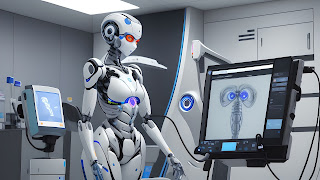The field of healthcare has been witnessing a transformative wave in recent years, thanks to the integration of Artificial Intelligence (AI) into diagnosis and treatment processes. This groundbreaking technology has the potential to revolutionize the way we approach healthcare, making it more efficient, accurate, and accessible. In this article, we will delve into the various ways AI is reshaping the healthcare landscape, from early diagnosis to personalized treatment plans, and explore the challenges and opportunities it presents.
The Power of Early Diagnosis
Early diagnosis is often the key to successful treatment in many medical conditions. AI has made significant strides in this aspect by enhancing the accuracy and speed of disease detection. One of the most notable applications is in the field of radiology, where AI algorithms are aiding radiologists in interpreting medical images like X-rays, MRIs, and CT scans.
AI-powered image analysis tools can quickly identify abnormalities and anomalies that might be missed by the human eye. For example, Google's DeepMind developed an AI system that can detect eye diseases such as diabetic retinopathy and macular degeneration from retinal scans with remarkable accuracy. This early detection can prevent vision loss and improve the quality of life for patients.
Moreover, AI can analyze vast datasets of patient records and medical histories to identify patterns and risk factors associated with various diseases. Predictive algorithms can help clinicians identify patients at high risk for conditions like diabetes or heart disease, allowing for proactive interventions and lifestyle modifications.
Personalized Treatment Plans
AI's ability to process and analyze vast amounts of data extends beyond diagnostics. It enables the creation of personalized treatment plans tailored to individual patients. This approach, known as precision medicine, takes into account a patient's genetic makeup, lifestyle, and medical history to deliver the most effective and least invasive treatment.
One notable example is in the field of oncology. AI-driven genetic profiling can help oncologists select the most suitable chemotherapy drugs based on a patient's tumor genetics, maximizing treatment efficacy while minimizing side effects. This not only improves patient outcomes but also reduces healthcare costs by avoiding ineffective treatments.
Furthermore, AI-driven treatment recommendations can evolve over time as more patient data becomes available. This adaptability ensures that treatment plans remain relevant and effective, especially in cases of chronic diseases where the patient's condition may change over time.
Enhanced Drug Discovery
The development of new drugs is a lengthy and costly process. AI is poised to accelerate this process by analyzing biological data, predicting potential drug candidates, and simulating their effects on the human body. Pharmaceutical companies are increasingly turning to AI to streamline drug discovery and development.
Machine learning models can analyze vast datasets of chemical compounds, genetic information, and clinical trial data to identify potential drug candidates more efficiently than traditional methods. This not only speeds up the process but also reduces the likelihood of costly failures in late-stage clinical trials.
AI can also play a crucial role in repurposing existing drugs for new uses. By analyzing the interactions between drugs and their targets in the body, AI algorithms can identify opportunities to use approved medications to treat different diseases. This approach has the potential to bring life-saving treatments to market faster and at a lower cost.
Telemedicine and Remote Monitoring
The COVID-19 pandemic accelerated the adoption of telemedicine, and AI is an integral part of this transformation. Telemedicine platforms equipped with AI-powered chatbots and virtual assistants can provide patients with instant medical information and schedule appointments with healthcare providers. Moreover, AI can analyze patient-generated health data from wearable devices, enabling remote monitoring of chronic conditions.
For example, patients with diabetes can use continuous glucose monitors that send real-time data to their healthcare providers. AI algorithms can analyze this data to detect trends and deviations, allowing for timely interventions and adjustments to treatment plans. This not only improves patient outcomes but also reduces the burden on healthcare systems.
Challenges and Ethical Considerations
While AI holds immense promise in healthcare, it also presents significant challenges and ethical considerations. One of the primary concerns is data privacy and security. AI algorithms require access to large volumes of sensitive patient data, raising concerns about data breaches and misuse.
Additionally, there is a risk of bias in AI algorithms, as they may be trained on datasets that do not represent the diversity of the patient population. This bias can lead to disparities in healthcare outcomes, where certain groups receive suboptimal care.
The ethical use of AI in healthcare also involves issues such as transparency, accountability, and informed consent. Patients and healthcare providers need to understand how AI systems make decisions and have confidence in their reliability.
The Future of Healthcare
In conclusion, AI is rapidly transforming healthcare by improving early diagnosis, enabling personalized treatment plans, enhancing drug discovery, and facilitating telemedicine and remote monitoring. These advancements have the potential to make healthcare more efficient, accessible, and effective. However, addressing challenges related to data privacy, bias, and ethics is crucial to realizing the full potential of AI in healthcare. As technology continues to evolve, it is essential to strike a balance between innovation and responsible use to ensure that AI benefits all patients and healthcare providers alike. The future of healthcare is undoubtedly intertwined with the power of artificial intelligence.






No comments:
Post a Comment